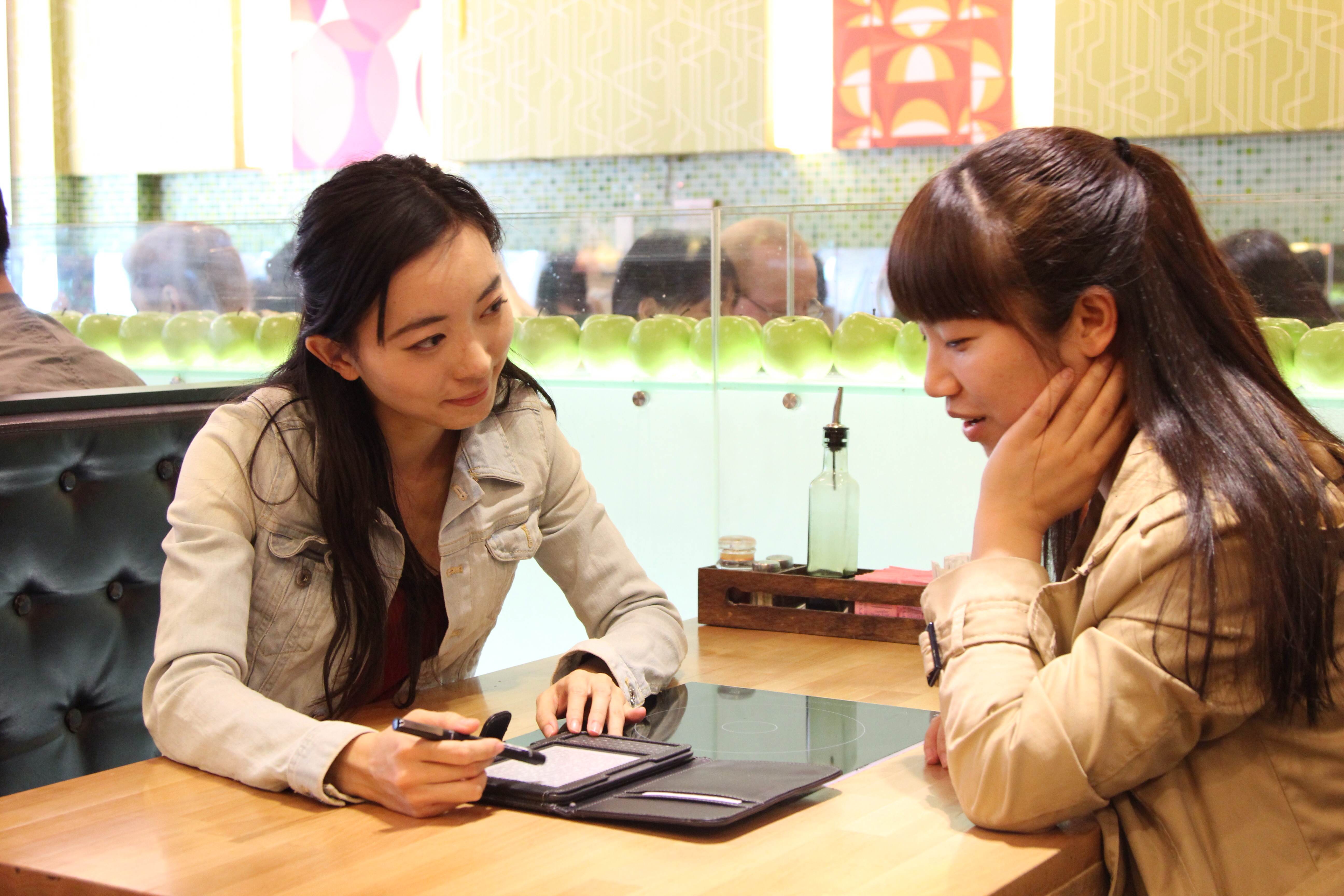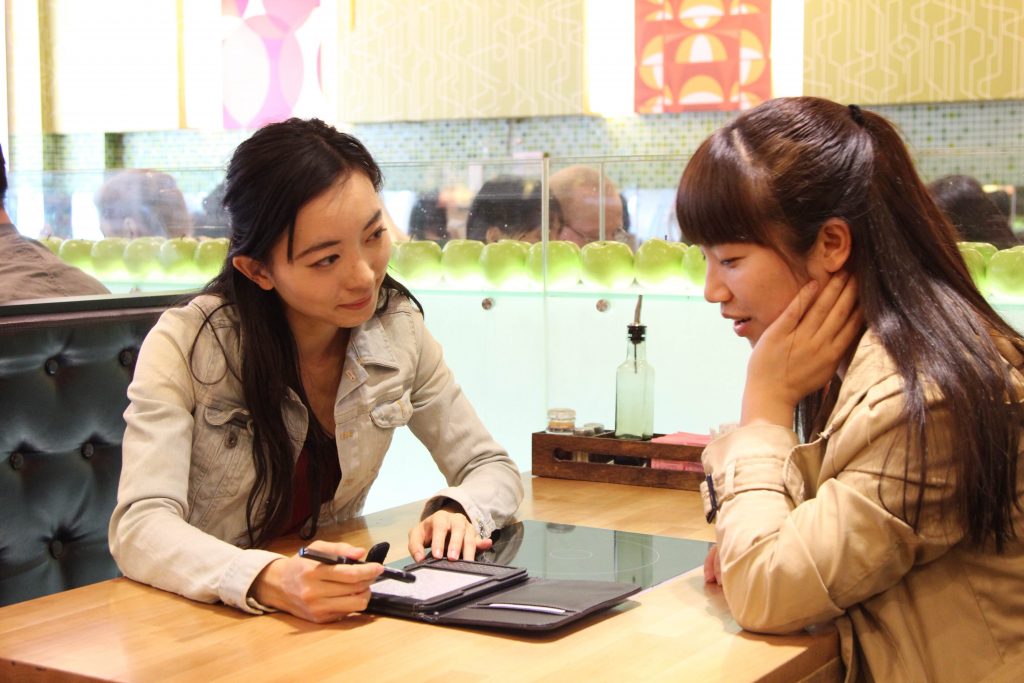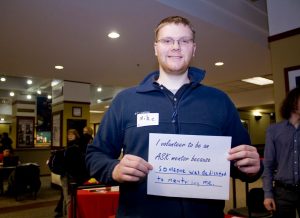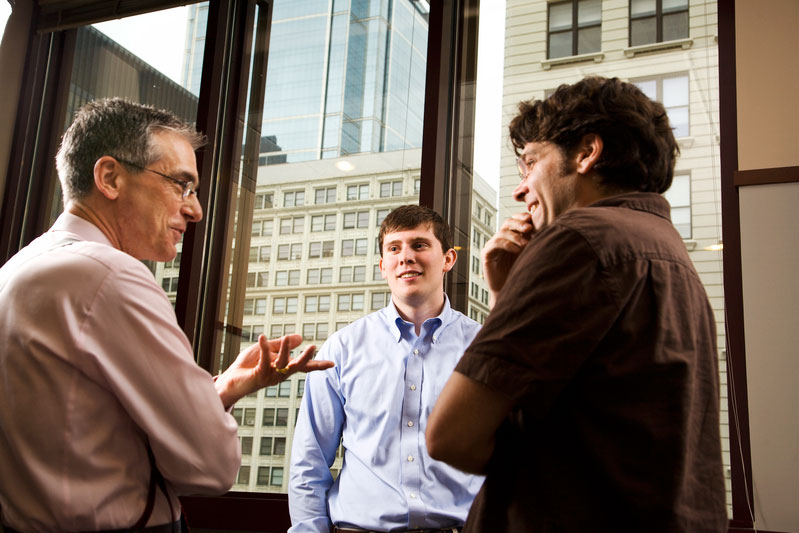
by jlansber | Jun 28, 2014 | Scholarly Pursuits
A Supportive Work Culture Helps Women “Lean In”

Research co-authored by Assistant Professor of Management Alyssa Westring offers new insights into the debate sparked by Facebook COO Sheryl Sandberg’s best-selling book about the need for women to “lean in” to their careers to succeed.
Westring says, based on her research, “If we truly want more women to ‘lean in,’ we need to focus on the larger context— to think hard about how to create workplace cultures where women have the opportunity to thrive.”
Westring and her colleagues “made a remarkable discovery” when they surveyed 133 women physicians and biomedical researchers about work-family conflict for a study published in Academic Medicine, Westring writes in a Harvard Business Review blog. “Women working 60 hours a week in the most supportive departments fared significantly better than those working 45 hours a week in work units viewed as less supportive.”
The research found that supportive departments had four main characteristics: they recognized and appreciated nonwork aspects of life; provided equal access to resources and opportunities, such as administrative support, research space and funding and committee participation; addressed subtle and overt gender biases organizationwide; and were led by supervisors who actively supported women’s careers.
Low Interest Rate Mortgage Financing Challenges Housing Market Rebound
Millions of households that purchased homes or refinanced mortgages during the last four years, when interest rates were at historic lows, could challenge a housing market recovery if long-term interest rates were to rise quickly in the coming years, according to research from the Institute for Housing Studies at DePaul University. Increases in mortgage rates are expected due to continued pull back in the Federal Reserve’s quantitative easing policy, the study’s authors note.
“This research shows that locked-in households will be reluctant to sell their homes and finance other purchases at higher interest rates,” says Patric H. Hendershott, a senior research fellow at the institute, who coauthored the study with Jin Man Lee, the institute’s research director, and
James D. Shilling, professor and the Michael J. Horne Chair in Real Estate Studies.
Hispanic-Owned Businesses Bloom in Illinois
 Hispanic-owned businesses are a small but growing force in the Illinois economy, according to a white paper sponsored by the Richard H. Driehaus Center for International Business in collaboration with the Illinois Hispanic Chamber of Commerce and its Center for Hispanic Entrepreneurship.
Hispanic-owned businesses are a small but growing force in the Illinois economy, according to a white paper sponsored by the Richard H. Driehaus Center for International Business in collaboration with the Illinois Hispanic Chamber of Commerce and its Center for Hispanic Entrepreneurship.
Hispanic-owned ventures account for just 5 percent of the state’s businesses, but their number grew by 43 percent, compared with 16 percent for all other companies, from 2002 to 2007. During that period, payroll for Hispanic businesses rose by 28 percent, eight times that of other businesses, according to the research, which was based on U.S. Census data.
– Business Exchange Staff

by jlansber | Jun 20, 2014 | Connections

ASK volunteer Yuanyun (Ella) Peng (BUS MS ’10) mentors Kellstadt student Lian (Wendy) Yang.
As a finance student at DePaul, Michael Kueker sought advice from others to help shape his professional life. “I knew that I couldn’t do this alone and that it would take much more than just me trying to put my career together,” he says.
He took advantage of DePaul’s Alumni Sharing Knowledge (ASK) program, which has a volunteer network of more than 1,100 alumni and friends of DePaul who offer career guidance to students and alumni. After graduation, Kueker (BUS ’08) found a way to give back to the program that helped him: he transitioned from mentee to mentor.
“Becoming a mentor was my acknowledgment of how fortunate I had been to have my own mentors at the right times,” says Kueker, a bank examiner at the Federal Reserve Bank of Chicago and a member of the ASK Advisory Board.
Kueker’s story isn’t unique. “The pay-it-forward spirit is very strong among ASK mentors. I would estimate that 30 to 40 percent of our current mentors were once mentees themselves,” says Gina Sian (CDM ’96, LAS MS ’13), DePaul’s ASK program director.
Originally created in the mid-1990s, the ASK network started as an information resource for students seeking to jump-start their careers. It became a fully developed program in 2000 and has grown to include volunteer mentors from varied backgrounds and all DePaul colleges and schools, across the United States and around the world. Students and alumni can reach out to potential mentors through ASK’s online database, and mentoring pairs can meet on their own time and interact through ASK events.
Bryan Yankton (BUS ’11) was drawn to ASK because the program gave him a perspective he couldn’t get from others in his life. His mother, an immigrant from the Philippines, wanted him to go into a health career, but he was drawn in a different direction. “I wanted to do business, and she didn’t know how to start a career in business. I thought [ASK] would be a great program to get insight and knowledge from someone else in the same industry,” he says.
Yankton had one mentor in particular who “went above and beyond” by advising him which classes to take for his honors finance track, helping him prepare for job inter¬views and providing other real-world insights into his career planning. “That’s what made me want to be a mentor now and do the same for current students,” says Yankton, a senior analyst at Wolters Kluwer.
That ASK mentors come from a variety of back-grounds, including multiple business disciplines, helped Yuanyun (Ella) Peng (BUS MS ’10) when she turned to the program while job searching. “I was eager to talk to mentors who finished a similar program and were doing well in the type of job I was looking for. After talking to several mentors, they suggested that market research would be a good fit for my background as an international student,” says Peng, who is now a research analyst at Millward Brown.

Michael Kueker (BUS ’08), an ASK mentee now mentor, shows his appreciation during an event for National Thank Your Mentor Day.
Peng knew right away that the ASK program was the right fit for her. “As soon as I was a mentee, even while receiving help from mentors, I had made up my mind that one day I would become a mentor as well, giving back what I have to those in need,” she says.
Alumni don’t need special skills to become mentors, just a willingness to share their insights. “There is great power in storytelling, especially when it’s based on firsthand experience of successes and challenges,” Sian says. “ASK offers a perfect way for our alumni to contribute to some-one else’s success simply through their words of wisdom and encouragement.”
For Yankton, the best part of being an ASK mentor is passing along what he has learned over the years. “If only I’d known all the information I know now back when I was still in school! I felt every bump that I ran into during college and my career application process, so I want to alleviate that for current students at DePaul by sharing my knowledge,” he says.
Learn more about DePaul’s Alumni Sharing Knowledge network.
By Jennifer Leopoldt

by jlansber | Jun 2, 2014 | Notes from the Dean
 How big is big data? Consider this: before you finish reading this column, Google will process more than 2 million searches, Web shoppers will spend more than $272,000 online, Facebook users will share more than 684,000 posts, brands will attract at least 34,000 Facebook “likes” and Twitter will host 100,000 tweets.
How big is big data? Consider this: before you finish reading this column, Google will process more than 2 million searches, Web shoppers will spend more than $272,000 online, Facebook users will share more than 684,000 posts, brands will attract at least 34,000 Facebook “likes” and Twitter will host 100,000 tweets.
This deluge of digital activity happens every minute of every day. It’s part of the exponential growth of data stored in public and private—data that can now be measured in exabytes, or 1,000,000,000,000,000,000- byte increments.
Hidden in this sea of data is a treasure trove of competitive intelligence for businesses. For organizations able to analyze and interpret it effectively, big data can yield deep insights about customers, suppliers, employees and market trends that have the potential to drive innovation, boost productivity and fuel growth.
However, big data also comes with big responsibilities for organizations to ensure the privacy and security of the people behind the numbers. In our cover story and online coverage, we explore these issues through the lenses of alumni, faculty members and experts who are at the forefront of the big data revolution. The rise of big data also is having a big impact on the job market. A recent IBM survey of 900 executives worldwide revealed that a key challenge facing business is finding enough talent skilled in analyzing and interpreting big data.
To help our students take advantage of these opportunities, Kellstadt will soon introduce new, specialized master’s degrees focusing on business data analytics in several disciplines. These degrees will equip our students with the tools and knowledge needed to distill large-scale data into valuable insights that drive business strategy.
Meanwhile, our plans to launch the college’s first doctoral degree also center on creating a distinctive program for executives that emphasizes analytical skills. Our Executive Doctorate in Business Administration degree is designed for business leaders who want to master applied research methods for tackling complex, big-picture business issues.
Finally, the redesign of this publication was guided primarily by data gathered from you, our alumni. In response to your interests, we have expanded Business Exchange (formerly Commerce Exchange) by adding new features that will help you stay engaged with DePaul’s business school and its robust alumni network. The new publication explores major business trends through the thought leadership of alumni, faculty and industry experts. We’ll spotlight advice, resources and connections that promote professional growth among our alumni. We’ll keep you updated on faculty achievements and research that under-score the quality of the business school you attended. And we’ll share the most recent accomplishments of your fellow graduates.
Ray Whittington
Dean, Driehaus College of Business

by jlansber | Jun 2, 2014 | College News
Financier Warren Buffett Shares Wisdom With MBA Students

What’s it like to discuss careers, investing and the economy with Berkshire Hathaway CEO Warren Buffett? For MBA student Kate Stevenson, it felt like investing two hours to gain “the lessons of a lifetime.”
Stevenson and 19 other DePaul graduate business students were invited to query the “Oracle of Omaha” and tour several Berkshire Hathaway businesses during a visit to the multinational conglomerate’s Omaha headquarters in October. The students were chosen from more than 300 Kellstadt Graduate School of Business applicants who sought a chance to meet the renowned business leader, investor and philanthropist. Kellstadt was among a select group of only seven business schools, including Harvard and Columbia, asked by Berkshire to participate in the student forum. Alumnus Frank Ptak (BSC ’65), president and CEO of Marmon Group, a Berkshire Hathaway company, helped secure DePaul’s invitation.
Buffett answered a wide range of questions during a two-hour Q&A session. He advised students to be true to themselves and follow their career passions.
“Very few people succeed at something that doesn’t excite them,” he said. “Find a job you would do even if you were already rich and didn’t need the money. I’m 83 and still excited by what I do.”
Scholarships Expand for Alumni and New Graduate Business Students
 DePaul is making graduate education more accessible for university alumni and new Kellstadt students by increasing its scholarship offerings.
DePaul is making graduate education more accessible for university alumni and new Kellstadt students by increasing its scholarship offerings.
DePaul alumni who wish to earn another degree from their alma mater through the Double Demon Scholarship program begun last year can now apply the scholarships to graduate study at Kellstadt or six other DePaul colleges and schools.
Alumni receive a 25 percent discount on tuition for master’s degree programs and select certificate programs. Meanwhile, beginning this fall, new students who enroll in Kellstadt degree programs may be eligible for thousands of dollars in DePaul scholarships, with award amounts determined by each student’s academic profile.
The Kellstadt Graduate Scholarship is for domestic students, and the Kellstadt Dean’s Scholarship is for students who require a visa to study in the United States. For more information about scholarship award amounts, eligibility and deadlines, contact the Kellstadt Graduate School of Business office at (312) 362-8810 or kgsb@depaul.edu.
Business Programs Receive High Marks in Three Rankings
The Driehaus College of Business was recognized for its academic excellence this year in the following rankings:
No. 1: Kellstadt’s Master of Science in Taxation (MST) tied for first place in TaxTalent.com’s ranking of the best MST programs in the nation, based on a survey of tax firm hiring managers.
No. 24: DePaul’s undergraduate entrepreneurship program again made the annual list of the best colleges for entrepreneurs published by Entrepreneur Magazine and The Princeton Review.
Top 30: Thirteen of DePaul’s graduate business degree programs earned top-30 rankings among U.S. business schools in an international survey of 1,000 business school deans conducted by Paris-based education.
– Business Exchange Staff

by jlansber | Jun 2, 2014 | Online Extras

In the decade since LinkedIn began as a career website, online networking has taken on new importance. “In the beginning, it was more a question of, ‘Should I make a profile?’ Now it’s a given that you need to be on LinkedIn to have a professional presence,” says Christa Hinton (MBA ’98, EdD ’12), assistant dean for the Driehaus College of Business and director of the Kellstadt Career Management Center.
Even though online networking has become an accepted part of professional culture, business students and alumni often still wonder how to best manage a profile. Hinton and Colleen Fashing Reaney, associate director of alumni relations, detail four ways to make the most of LinkedIn.
1. Provide the right information.
A LinkedIn profile looks a bit like a resume, but its flexible design lets you add more detail. Instead of just listing your job description, tailor your profile with specific, measurable accomplishments and a headline that accurately describes what you do.
Unlike regular resumes, LinkedIn also has space for a picture. Some people may be uncomfortable posting a photo online, either for privacy reasons or because it’s not a cultural norm in the United States. However, both Hinton and Reaney encourage using a photo. “If you don’t have a headshot, your profile isn’t considered 100 percent complete and you can’t progress with some of the resources on LinkedIn,” Reaney says.
If you want to apply for job postings through LinkedIn, pay attention to the recommendations section. Without three to five recommendations—short endorsements you ask others to write—you might not be considered for certain opportunities. Whereas references for a job often are past supervisors, LinkedIn recommendations can come from co-workers at any level. “I encourage people to do a 360 recommendation: somebody above you, somebody below you and somebody at your level,” Reaney says.
Also, make sure to list your education on your profile. LinkedIn’s search function lets you find other people who went to DePaul, which can be helpful for connecting with old classmates or job searching.
2. Create a dynamic profile.
Keeping your LinkedIn profile up to date is vital. “It’s a living thing that needs to be nurtured,” Hinton says, comparing it to keeping a current resume. “You wouldn’t let your resume sit for 10 years and then go apply for a new job with that same resume.”
LinkedIn is also easier to update than a resume. LinkedIn allows you to edit sections as much as you want; if you try something that you don’t like, you can easily delete it and start over.
3. Decide how you want to connect.
LinkedIn allows users to link with people they actually know and to reach out to potential connections they have never met. Deciding which approach you want to take is personal, and there are two schools of thought.
“If I cannot recognize your name or your face by looking at your profile, I will not connect with you,” Reaney says. Her philosophy is that having multiple “touches” with a person—meeting at a networking event, emailing or having coffee—before asking to connect on LinkedIn can lead to a stronger relationship.
In Hinton’s opinion, “It never hurts to ask.” She is open to connecting with people she doesn’t personally know as long as they explain why they want to link with her. LinkedIn allows users to personalize every request beyond the basic “I’d like to add you to my professional network” wording. For example, Hinton encourages Business Exchange readers who want to learn more about LinkedIn to send her a connection request mentioning this article.
4. Be an active participant.
LinkedIn is about more than just creating a profile. To get the most use out of the site, look in the “Interests” section for companies to follow and groups to join. “When you’re part of a group, it is important to post occasionally, because that helps people know who you are and that you’re part of a larger dialogue,” Hinton says.
Amid updating your professional profile and connecting online, don’t forget that personal relationships still matter when networking. “Remember to get out of your house and actually shake some hands and meet people face to face,” Reaney suggests.
Learn More
Connect with alumni from all of DePaul’s colleges and schools through the DePaul University Alumni Association group on LinkedIn, which has more than 19,500 members.
Set up an appointment with the Kellstadt Career Management Center by calling (312) 362-8272 or emailing mba@depaul.edu.
Get career advice from the Office of Alumni Relations by calling (800) 437-1898 or emailing dpalumni@depaul.edu.
By Jennifer Leopoldt

 Hispanic-owned businesses are a small but growing force in the Illinois economy, according to a white paper sponsored by the Richard H. Driehaus Center for International Business in collaboration with the Illinois Hispanic Chamber of Commerce and its Center for Hispanic Entrepreneurship.
Hispanic-owned businesses are a small but growing force in the Illinois economy, according to a white paper sponsored by the Richard H. Driehaus Center for International Business in collaboration with the Illinois Hispanic Chamber of Commerce and its Center for Hispanic Entrepreneurship.







